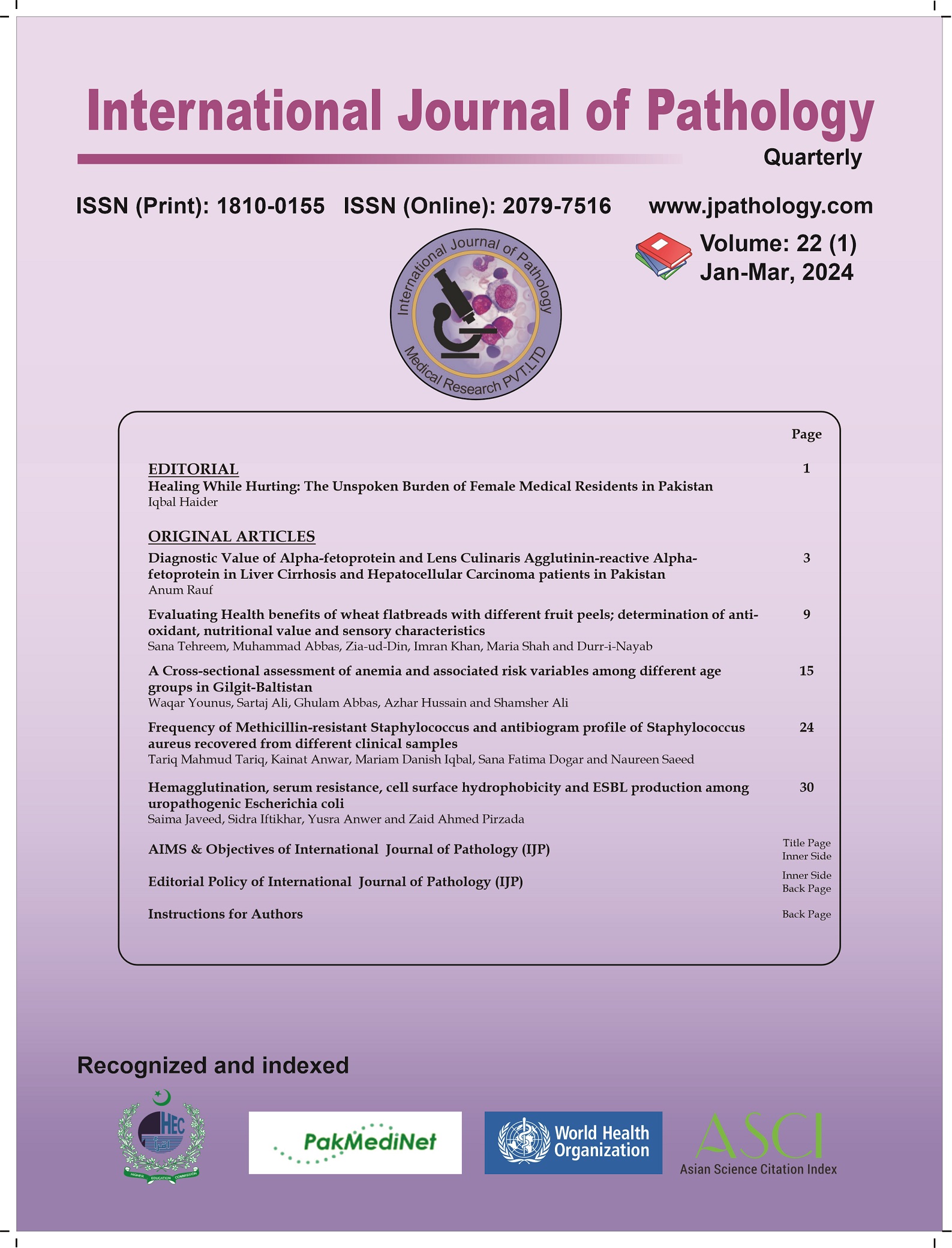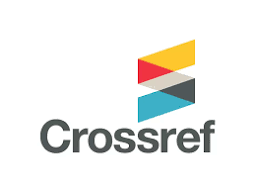Diagnostic value of alpha-fetoprotein and lens culinaris agglutinin-reactive Alpha-fetoprotein in liver cirrhosis and hepatocellular carcinoma patients in Pakistan
DOI:
https://doi.org/10.59736/IJP.22.01.880Keywords:
Biomarkers, Fetoprotein, Hepatocelluar Carcinoma, Liver CirrhosisAbstract
Background: Hepatocellular carcinoma (HCC) is the most commonly encountered liver cancer. Because of latent HCV infections, there is projected rise in new HCC cases in Pakistan; with the onset of HCC several decades after initial infection has occurred. As it is diagnosed at very late stage, predicted outcome of HCC is poor. This results in effective medical intervention difficult. The purpose of this study is to establish a serum marker and/or panels of serum markers, that can detect the at risk patients with chronic liver disease, not only before but also after early development of HCC.
Methods: This study was conducted for ten months in Lahore General Hospital, Lahore, Punjab, Pakistan after taking the approval from the ethical board. A total of eighty patients (40 patients of HCC and 40 patients of Liver cirrhosis) were included using non-probability, consecutive sampling. AFP and AFP-L3 levels of these patients were measured. The data was analyzed using SPSS Ver. 25. A p-value of ≤0.05 was considered as statistically significant.
Results: In group 1, the mean age of patients was 60.02 ± 11.5 years and in group 2, it was 60.80 ± 7.42 years. In group 1, the mean of AFP was 64.93 ± 171.76 (ng/mL) and AFP-L3 was 0.56 ± 0.51(ng/mL). On the other hand, in group 2, the mean of AFP was 329.88 ± 231.55 (ng/mL) and AFP-L3 was 177.59 ± 104.10 (ng/mL). Significant association was found between AFP and AFP-L3 in both groups. Receiver operating characteristic (ROC) curve for AFP and AFP-L3 in relation to both groups obtained. The sensitivity of AFP was 85% and specificity was 80%. The sensitivity and specificity of AFP-L3 was 90 and 100%, respectively.
Conclusion: AFP-L3 has a better diagnostic value for Hepatocellular carcinoma than AFP
References
Armengol C, Sarrias MR, Sala M. Carcinoma hepatocelular: present and future. Medicina clínica. 2018 May 23; 150(10):390-7. doi:10.1016/j.medcli.2017.08.010
Philips CA, Rajesh S, Nair DC, Ahamed R, Abduljaleel JK, Augustine P. Hepatocellular carcinoma in 2021: An exhaustive update. Cureus. 2021; 13(11):e19274. doi:10.7759/cureus.19274
Villanueva A. Hepatocellular carcinoma. N Engl J Med 2019; 380:1450-62.
Caines A, Selim R, Salgia R. The changing global epidemiology of Hepatocellular carcinoma. Clin Liver Dis 2020; 24:535-47.
Buonaguro L. Human Hepatocellular carcinoma (HCC). Cancers(Basel).2020;12(12):3739.doi:10.3390/cancers12123739
Desai A, Sandhu S, Lai JP, Sandhu DS. Hepatocellular carcinoma in non-cirrhotic liver: a comprehensive review.World J Hepatol. 2019; 11(1):1-18. doi:10.4254/wjh.v11.i1.1
Raees A, Kamran M, Özkan H, Jafri W. Updates on the diagnosis and management of hepatocellular carcinoma. Euroasian journal of hepato-gastroenterology. 2021 Jan; 11(1):32.
Torres MC, Jaffe A, Perry R, Marabotto E, Strazzabosco M, Giannini EG. Diabetes medications and risk of HCC. Hepatology 2022; 00:1-8.
Parikh ND, Mehta AS, Singal AG, Block T, Marrero JA, Lok AS. Biomarkers for early detection of Hepatocellular carcinoma. Cancer Epidemiol Biomark Prev. 2020; 29(12):2495-03. doi:10.1158/1055-9965.EPI-20-0005
Gupta P, Soundararajan R, Patel A, Kumar-M P, Sharma V, Kalra N. Abbreviated MRI for Hepatocellular carcinoma screening: a systematic review and meta-analysis. J Hepatol. 2021; 75(1):108–19. doi:10.1016/j.jhep.2021.01.041
Yang JD, Heimbach JK. New advances in diagnosis and management of Hepatocellular carcinoma. BMJ. 2020; 371:m3544. doi:10.1136/bmj.m3544
Heimbach JK, Kulik LM, Finn RS, Sirlin CB, Abecassis MM, Roberts LR, et al. AASLD guidelines for the treatment of Hepatocellular carcinoma. Hepatology. 2018; 67(1):358-80. doi:10.1002/hep.29086
Hanif H, Ali MJ, Susheela AT, Khan IW, Luna-Cuadros MA, Khan MM, et al. Update on the applications and limitations of alpha-fetoprotein for hepatocellular carcinoma. World J Gastroenterol. 2022; 28(2):216-29. doi:10.3748/wjg.v28.i2.216
Debes JD, Romagnoli PA, Prieto J, Arrese M, Mattos AZ, Boonstra A, et al. Serum biomarkers for the prediction of Hepatocellular carcinoma. Cancers (Basel). 2021; 13(7):1681. doi:10.3390/cancers13071681
Yu J, Park R, Kim R. Promising novel biomarkers for Hepatocellular carcinoma: diagnostic and prognostic insights. J Hepatocell Carcinoma. 2023; 10:1105-27. doi:10.2147/JHC.S341195
Teerha P, Tawesak T, Satawat T, Wattana S, Ignacio EJ, Marta B, et al. Multimarker Panels for detection of Early Stage Hepatocellular carcinoma: A Prospective, Multicenter, Case-Control Study. Hepatol Commun. 2022; 6(4):679-91. doi:10.1002/hep4.1847
Chen S, Li J, Tan X, Xu Q, Mo Y, Qin H, et al. Clinical role of combining alpha-fetoprotein and lens culinaris agglutinin-reactive fraction of alpha-fetoprotein for Hepatocellular carcinoma: evidence from literature and an original study. J Clin Lab Anal. 2020; 34(7):e23262. doi:10.1002/jcla.23262
Hamid S, Umar M, Alam A, Siddiqui A, Qureshi H, Butt J. PSG consensus statement on management of hepatitis C virus infection-2003. J Pak Med Assoc. 2004; 54(3):146–50.
Saleem U, Aslam N, Siddique R, Iqbal S, Manan M. Hepatitis C virus: Its prevalence, risk factors and genotype distribution in Pakistan. Eur J Inflamm 2022; 20. doi:10.1177/1721727X221144391
Arshad A, Ashfaq UA. Epidemiology of Hepatitis C Infection in Pakistan: Current Estimate and Major Risk Factors. Crit Rev Eukaryot Gene Expr. 2017; 27(1):63-77. doi:10.1615/CritRevEukaryotGeneExpr.2017018953
Shah SM, Butt Z, Waqas M. Alpha Fetaprotein; useful as screening test for Hepatocellular carcinoma due to chronic hepatitis C. Professional Med J. 2017; 24(5):641-45. doi:10.17957/TPMJ/17.3690
Cerban R, Ester C, Lacob S, Ghioca M, Paslaru L, Dumitra R, et al. Alpha-fetoprotein, Alpha-fetoprotein L3, Protein-induced by vitamin K absence, Glypican 3 and its combination for diagnosis of Hepatocellular carcinoma. Surg Gastroenterol. 2019; 24(1):37-44. doi:10.21614/sgo-24-1-37
Lee WC. Value of alpha-fetoprotein in hepatocellular carcinoma. Transl Gastroenterol Hepatol. 2021; 6:52. doi:10.21037/tgh.2019.12.19
Ibrahim HM, Elghannam MZ, Elkhawaga OA, El-Sokkary AM. Evaluation of serum alpha-fetoprotein-L3 as an accuracy novel biomarker for the early diagnosis of hepatocellular carcinoma in Egyptian patients. Saudi J Biol Sci.2021;28(10):5760-64.
Song T, Wang L, Su B, Zeng W, Jiang T, Zhang T, et al. Diagnostic value of alpha-fetoprotein, Lens culinaris agglutinin-reactive alpha-fetoprotein, and des-gamma-carboxyprothrombin in hepatitis B virus-related hepatocellular carcinoma. Int J Med Res. 2020; 48(3):300060519889270. doi:10.1177/0300060519889270
Ibrahim AA, Allah RM, El Hammaday AM, Sarhan RS, Khalil MA, Rahman MA. Diagnostic accuracy of lectin-reactive alpha-fetoprotein (AFP-L3) in the diagnosis of hepatitis C virus-related hepatocellular carcinoma. Benha Med J.2018;35(3):312 -16.doi:10.4103/bmfj.bmfj_33_18
Downloads
Published
Issue
Section
License
Copyright (c) 1970 Anum Rauf

This work is licensed under a Creative Commons Attribution-NonCommercial 4.0 International License.
Readers may “Share-copy and redistribute the material in any medium or format” and “Adapt-remix, transform, and build upon the material”. The readers must give appropriate credit to the source of the material and indicate if changes were made to the material. Readers may not use the material for commercial purpose. The readers may not apply legal terms or technological measures that legally restrict others from doing anything the license permits.


